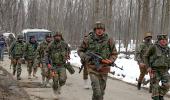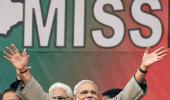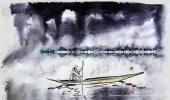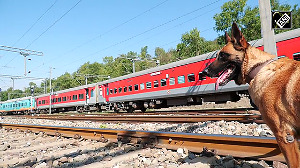‘And for all the talk of Trump’s mediation offer for Kashmir, once New Delhi announced its intention to repeal Article 370 of the Indian Constitution, Washington was completely silent.’
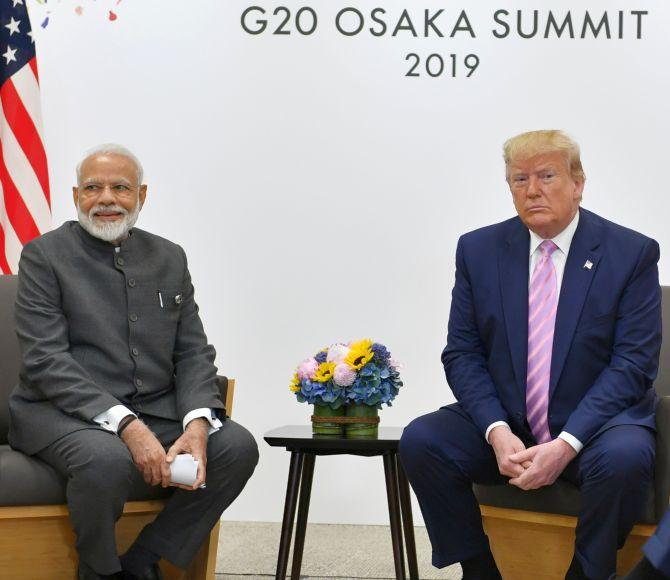
‘India remains a critical player in the Trump administration’s thinking,’ Michael Kugelman, Deputy Director, Asia Programme, and South Asia Senior Associate at the Woodrow Wilson Centre in Washington, DC, tells Rediff.com’s Archana Masih in the second part the interview.
Part I: 'Revocation of Article 370 a game-changer for the ages'
What challenges do you foresee for the Modi government in the short term in its relations with the Trump administration? How has Imran Khan’s visit to the United States affected India-US relations?
We can be sure that New Delhi wasn’t exactly overjoyed by Khan’s successful trip, but I don’t think we should overstate its impact on US-India relations.
And for all the talk of Trump’s mediation offer for Kashmir, once New Delhi announced its intention to repeal Article 370 of the Indian Constitution, Washington was completely silent -- underscoring that it’s not going to fall for the trap likely hoped for by Pakistan of the United States reacting to India’s controversial move on Article 370 by proposing to get involved to ease tensions.
For me, the main challenges for the Modi government with the Trump administration right now are on the trade side.
It’s quite clear that Trump isn’t going to budge on the tariff issues; he has taken a repeatedly hard line on trade, and with the US presidential election fast approaching, he’s not going to want to waver on that hard line.
In this regard, New Delhi’s hands are tied when it comes to negotiating this issue because it knows that the US side won’t budge.
Perhaps the biggest immediate term challenge for Modi with the US-India relationship is the S-400 deal.
If India goes through with that deal, and the Trump White House sanctions New Delhi, then the US-India relationship could be plunged into one of its most serious crises in years.
But would Trump actually pull the trigger and penalise India? I’m not sure he would, especially as he seems to be less hostile to Russia than he is to Iran, and may therefore be willing to give India a pass for doing business with Moscow. But that said, Trump is one unpredictable fellow.
Why do you think Washington now has an almost schizophrenic view of New Delhi -- as an economic adversary on one hand and a security partner on the other?
India remains a critical player in the Trump administration’s thinking. It’s easy to get carried away by all the tensions on the trade side, and those tensions are very real and serious, but it’s also important to take stock of the current situation with US-India relations.
The security partnership continues to intensify, and the high-level exchanges continue to take place. It’s quite telling that even on the trade side, there have been frequent senior-level meetings to try to work through the tensions.
It’s also important to look at the US-India relationship through the broader lens of Trump’s worldview -- one in which overarching concerns about ‘America First’ mean that he won’t hesitate to pick trade fights with America’s closest partners in order to protect American jobs.
Indeed, we’ve seen US relations with all kinds of key partners -- from Japan to Mexico -- take a tumble on the trade side, even while those broader relationships remain sound. And the situation is the same for the US relationship with India.
Do you perceive a decline in Indo-US relations? If so, when did the decline begin and what were the reasons for this?
I perceive no decline in US-India relations. There are certainly setbacks, and new tensions, thanks in great part to the problems on the trade side. But the overall state of the partnership, mainly because of a security relationship fueled by sharply aligned interests, remains strong.
Even in a worst-case scenario -- where the Trump administration slaps sanctions on India for acquiring the S-400 package from Russia -- the relationship would rebound, albeit with some significant scars.
The convergences on the strategic side -- concerns about China and terrorism, desires for a free and open Indo-Pacific, and so on -- are too compelling to allow for a drift in the relationship.
Additionally, the deep levels of trust and goodwill to have been incorporated into the relationship in recent years; a strong, bipartisan consensus in Washington in favor of warm relations with India; and an Indian-American community that actively pursues efforts to keep the relationship humming: All of these factors ensure the relationship will remain stable and robust, despite the inevitable challenges.
Do you think India has fallen off the Trump administration’s radar, except on the trade and tariffs front?
Not at all. So long as Washington continues to regard China as its core foreign policy challenge, it’s not going to let India fall off its radar.
And given the hard line that the Trump White House is taking on China, we can be sure that Beijing will remain a pre-eminent concern for Washington.
Keep in mind that despite all the troubles on the trade side, the US-India relationship has continued to make major strides.
What we can likely expect next is for the two sides to reach agreement on the few remaining foundational accords for defence cooperation that have yet to be signed.
Prime Minister Modi will visit the US in September and is likely to meet President Trump in New York. How do you think that meeting will go?
It’s hard to know what may transpire in the relationship between now and September, but barring any major developments, we can expect the meeting to be warm and cordial.
There may be a feel cool moments, particularly if Trump chooses to talk to Modi about an Afghan peace process that has shut India out, or if the conversation turns to Russia or Iran, or if trade comes up.
But on the whole, we can expect the two to talk about the issues that most galvanise the partnership: cooperation to push back against the China threat, and counterterrorism.
Why did you say in your Dawn column that ‘Imran came, he saw and he conquered’?
Khan’s main mission while in Washington was to convince his interlocutors that Pakistan is a worthy partner -- not just in terms of cooperating on the peace process in Afghanistan, but also more broadly.
For Islamabad, Khan’s visit to Washington was meant to be a charm offensive more than anything else. And let’s be clear: Khan turned on the charm, and he was wildly successful in doing so.
His visit generated a fair amount of energy and enthusiasm in DC. He met with all the key senior people while also drawing extensive praise and, in the case of his public engagements, large crowds.
I can’t remember the last time a visiting Pakistani prime minister filled a large room on Capitol Hill, as Khan did when he was the guest of honour at a reception hosted by senior Congressional leaders. And I can’t remember the last time so many people -- from President Trump to Senator Lindsey Graham -- spoke so effusively about a Pakistani premier.
What are the five major gains that Pakistan made after Imran Khan’s visit to the Oval Office?
The first is respect. Pakistan has long claimed it doesn’t get enough of this from Washington, but it was in plentiful supply for Khan’s visit. US officials pulled out all the stops and dished out the praise.
The second is a commitment. For Pakistan, a key goal of Khan’s trip was getting assurances from Washington that it is willing to partner with Pakistan in a substantive way.
The statements and other messaging in Washington made clear that the Trump administration is willing to work with its Pakistani partner -- no matter how problematic the partnership may be.
The third is good PR. Pakistan always worries about its poor image abroad, and especially in the US. The powerful optics -- from Senator Graham’s effusive praise to a full room of members of Congress feting Khan -- had a softening effect on Pakistan’s reputation in a city that’s often not kind to Islamabad.
The fourth is money. The US didn’t restore its suspended security aid to Pakistan, but soon after Khan’s departure it did announce some new funding to cover technical assistance for Pakistan’s F-16 fleet.
The fifth is an annoyed India. New Delhi wasn’t exactly overjoyed about the four previous gains to come out of Khan’s visit. And for Pakistan, that’s a net positive.
How do you account for Imran Khan making such an impression in Washington, given the State Department and Pentagon’s previous history of suspicion and disenchantment with the Pakistan establishment since the War on Terror was launched?
Imran Khan is charismatic and quite familiar with the ways of the West, having lived in the UK for quite some time earlier in his life.
I think it’s this combination that enabled him to charm and win over his hosts in Washington. These are qualities that previous Pakistani leaders have had as well, but we haven’t seen a leader like this since Pervez Musharraf.
Let’s be clear, Musharraf had many friends in Washington (and he still does). More broadly, with the exception of the late Benazir Bhutto, it’s the Pakistani military leaders that have historically been most able to win over their American hosts -- thanks to that magical combination of charisma and familiarity with the West.
In the post-Musharraf era, there haven’t been many civilian leaders with that combination of traits -- until now.
This was the first time that a Pakistan prime minister was accompanied by the Pakistan army chief to the US -- was this America’s desire that both the civilian and military leadership sit at the same table to ensure that they were on the same page where the Afghan settlement was concerned?
Absolutely. I imagine that the Trump administration wanted both leaders to be together, so that it could deliver its core message to the two top leaders in Pakistan at the same time.
And that message, which clearly has relevance to the army chief given that Pakistan’s military calls the shots on foreign and security policy, was simple: Right now, the main focus of our relationship is peace in Afghanistan and counter-terrorism in Pakistan.
We would be happy to explore broadening our relationship once there’s been more progress in those two areas.
General Bajwa strangely does not appear in any official pictures at the White House or at the Pentagon. As ‘The man who was there and still not there’, what do you think he contributed to the US-Pak security conversation?
Bajwa’s lack of a public profile in Washington can be attributed to Islamabad’s desire to telegraph a message of civilian supremacy, even though we know that there is no civil supremacy in Pakistan.
Still, the optics of an omnipresent civilian leader and absent military chief are powerful, and they are particularly important to pull off in Washington.
We can be sure that any substantive conversations to come out of the visit took place between Bajwa and its interlocutors. To be sure, while pomp and circumstance and pageantry surrounded Khan’s engagements, Bajwa’s were all business -- and likely quite productive.
I think it’s quite clear that despite its oft-stated support for civilian-led democracy in Pakistan, Washington knows that when push comes to shove you have to talk to the generals where there is business to attend to in US-Pakistan relations.
In that regard, the few concrete achievements to come out of the visit -- such as the US decision to provide financial support to Pakistan’s F-16 fleet -- likely came out of conversations that Bajwa had at the Pentagon.
Do you think General Bajwa’s presence confirms that Imran Khan, more than any previous Pakistan prime minister, is a puppet of the Pakistani military? And someone who sees nothing wrong in blurring the lines between the civilian-military interface in Pakistan.
There’s something to be said that having Bajwa on hand, sent a message that Khan couldn’t make such an important trip on his own, thereby accentuating the military’s importance and Khan’s dependence on it. But I think we can look at this from a more positive lens as well.
I imagine one reason that Bajwa joined Khan was to telegraph a message of civil-military cooperation -- something that was lacking for a major part of the 2008-2018 period in Pakistan.
Civil-military tensions in Pakistan have long been a source of concern for Washington, and so one could argue that having Bajwa with Khan to present a united front was meant to reassure the United States that all was well on the civil-military front.
Don't miss part 3 of the interview on Tuesday!
